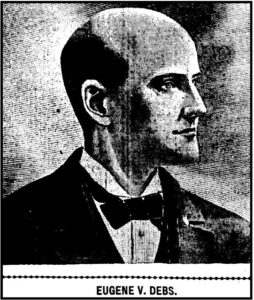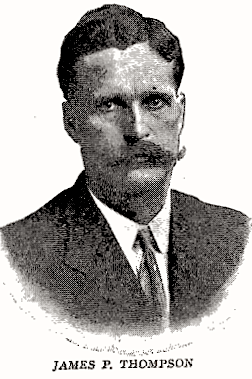 —————
—————
Hellraisers Journal – Sunday February 22, 1903
Rochester, New York – Eugene Debs Speaks on Socialism and the Labor Movement
Rochester Democrat and Chronicle (New York) of February 9, 1903:
SOME PHASES OF LABOR MOVEMENT
———-ADDRESS OF EUGENE V. DEBS AT FITZHUGH HALL.
———-THE WORKINGMAN’S HOPE
———-
Socialistic Programme Set Forth as
the Need of the People-The Tool of Production
-Reflections on Trusts-Panic Prophesied.
———-
Eugene V. Debs, of Denver, Col., the prominent labor leader and Socialist, spoke at Fitzhugh Hall yesterday afternoon, under the auspices of the Labor Lyceum. His subject was “Some Phases of the Labor Movement; or, Socialism and Civilization.” Mr. Debs was given an enthusiastic reception, and for two hours he had the close attention of the audience. The seats on the floor of the hall were filled and but few were empty in the gallery.
Phillip Jackson presided at the meeting and made a few remarks, after which he introduced Mr. Debs. In his eloquent address, Mr. Debs said, in part:
The labor question broadly stated is the question of all humanity and upon its just solution depend the peace of society and the survival of civilization. The central and controlling fact of civilization is the evolution of industry.
A little over a century and a quarter ago, the American colonists were compelled to declare their political independence. The people were then engaged largely in agricultural pursuits, what they manufactured was produced in simple and primitive ways and they used with their hands the tools with which they did their work. The problem of making a living was a comparatively easy one. Each man could with the product of his own labor satisfy his own wants.
Long ago the too simple tool of those days was touched by the magic want of invention, until its mechanism has now become marvelously complex. In the great modern industrial evolution, the workingman has suffered, and because of his ignorance has allowed the tool of production to pass from his grasp. The cunning that was in the hand of labor has passed into the machine. As competition has become keen, handicraft has been succeeded more and more by the machine work, until skilled labor has become common labor; the struggle for existence became so hard that woman was forced into the labor market and become a factor in industrial conditions.
As the evolution of machinery has continually progressed, it has been found that many of these could be operated by the deft touch of children, until now 3 million of these have been forced into the labor market in competition with men and women. This has resulted from the system that makes profit the all-important consideration and life of little importance. There must be cheap labor in spite of its effects on the lives of human beings.
The state of Alabama once had a law against child labor. The time is coming, however, when competition will force manufacturers to operate their factories where the raw materials are produced. This has already been done by the New England manufacturers. They went to the lawmakers of Alabama and said: “We must have cheap labor if we are to compete in the markets of the world, and in order to do this, we must employ the children in our mills. You have a law against the employment of children in this state. We should like it to come here, but, if this is enforced, it will compel us to go elsewhere.” What was the result? Today there is no law against the employment of children in Alabama.


